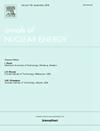核反应堆自主控制中机器学习和深度学习的进展与挑战
IF 2.3
3区 工程技术
Q1 NUCLEAR SCIENCE & TECHNOLOGY
引用次数: 0
摘要
本文综述了机器学习(ML)和深度学习技术在核反应堆自主控制中的应用进展。它涵盖了使用机器学习、深度学习算法和反应堆状态评估混合方法的智能诊断系统。在智能控制领域,讨论了传统的模糊控制、比例-积分-导数(PID)控制和模型预测控制(MPC)等方法,并结合神经网络,以及深度强化学习(DRL)来控制核反应堆。确定了主要挑战,包括系统集成、网络安全和监管适应。该综述强调了在实际反应堆,特别是先进和小型模块化反应堆中集成智能诊断和控制系统的未来研究的必要性。它还强调了在自主控制系统的设计阶段考虑网络安全以及更新监管框架以适应核电厂运营中人工智能驱动技术的重要性。本文章由计算机程序翻译,如有差异,请以英文原文为准。
Advancements and challenges of machine learning and deep learning in autonomous control of nuclear reactors
This review paper explores recent advancements in the application of machine learning (ML) and deep learning technologies for autonomous control in nuclear reactors. It covers intelligent diagnosis systems using ML, deep learning algorithms, and hybrid approaches for reactor condition assessment. In the area of intelligent control, traditional methods such as fuzzy control, proportional-integral-derivative (PID) control, and Model Predictive Control (MPC), coupled with neural networks, are discussed, as well as deep reinforcement learning (DRL) for controlling a nuclear reactor. Key challenges are identified, including system integration, cybersecurity, and regulatory adaptation. The review highlights the need for future research on integrating intelligent diagnosis and control systems in real-world reactors, particularly advanced and small modular reactors. It also stresses the importance of considering cybersecurity during the design phase of autonomous control systems and updates of regulatory frameworks to accommodate AI-driven technologies in nuclear power plant operations.
求助全文
通过发布文献求助,成功后即可免费获取论文全文。
去求助
来源期刊

Annals of Nuclear Energy
工程技术-核科学技术
CiteScore
4.30
自引率
21.10%
发文量
632
审稿时长
7.3 months
期刊介绍:
Annals of Nuclear Energy provides an international medium for the communication of original research, ideas and developments in all areas of the field of nuclear energy science and technology. Its scope embraces nuclear fuel reserves, fuel cycles and cost, materials, processing, system and component technology (fission only), design and optimization, direct conversion of nuclear energy sources, environmental control, reactor physics, heat transfer and fluid dynamics, structural analysis, fuel management, future developments, nuclear fuel and safety, nuclear aerosol, neutron physics, computer technology (both software and hardware), risk assessment, radioactive waste disposal and reactor thermal hydraulics. Papers submitted to Annals need to demonstrate a clear link to nuclear power generation/nuclear engineering. Papers which deal with pure nuclear physics, pure health physics, imaging, or attenuation and shielding properties of concretes and various geological materials are not within the scope of the journal. Also, papers that deal with policy or economics are not within the scope of the journal.
 求助内容:
求助内容: 应助结果提醒方式:
应助结果提醒方式:


